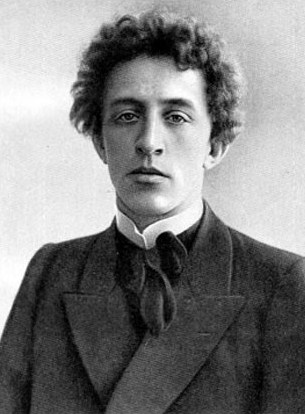

Queer Places:
Literatorskie Mostki
Saint Petersburg, Saint Petersburg Federal City, Russia
Smolensky Cemetery
Saint Petersburg, Saint Petersburg Federal City, Russia
 Alexander Alexandrovich Blok (28 November [O.S.
16 November] 1880 – 7 August 1921) was a Russian lyrical poet, writer,
publicist, playwright, translator, literary critic. With the collaboration on
The Puppet Booth, Mikhail Kuzmin
began his active career in the theater and his friendship with Blok. Kuzmin
fell under the spell of Blok, whom he pronounced a "splendid fellow," and
Blok, in his turn, took an immediate liking to Kuzmin, whom he saw often
during the readings and rehearsals that preceded the December opening. Blok's
appreciation for Kuzmin's talent grew apace and in the years to come he
forcefully defended his friend against charges of "immorality." Blok valued
Kuzmin's innate sense of theater, and invited him to a reading of his play The
Song of Fate on April 30, 1908, and two months later he persuaded Fedor
Komissarzhevsky to commission music from Kuzmin for a production of
Grillparzer's Die Abnfrau in his translation.
Alexander Alexandrovich Blok (28 November [O.S.
16 November] 1880 – 7 August 1921) was a Russian lyrical poet, writer,
publicist, playwright, translator, literary critic. With the collaboration on
The Puppet Booth, Mikhail Kuzmin
began his active career in the theater and his friendship with Blok. Kuzmin
fell under the spell of Blok, whom he pronounced a "splendid fellow," and
Blok, in his turn, took an immediate liking to Kuzmin, whom he saw often
during the readings and rehearsals that preceded the December opening. Blok's
appreciation for Kuzmin's talent grew apace and in the years to come he
forcefully defended his friend against charges of "immorality." Blok valued
Kuzmin's innate sense of theater, and invited him to a reading of his play The
Song of Fate on April 30, 1908, and two months later he persuaded Fedor
Komissarzhevsky to commission music from Kuzmin for a production of
Grillparzer's Die Abnfrau in his translation.
Blok was born in Saint Petersburg, into an intellectual family of Alexander Lvovich Blok and Alexandra Andreevna Beketova. His father was a law professor in Warsaw, and his maternal grandfather, Andrey Beketov, was a famous botanist and the rector of Saint Petersburg State University. After his parents' separation, Blok lived with aristocratic relatives at the manor Shakhmatovo near Moscow, where he discovered the philosophy of Vladimir Solovyov, and the verse of then-obscure 19th-century poets, Fyodor Tyutchev and Afanasy Fet. These influences would affect his early publications, later collected in the book Ante Lucem.
In 1903 he married the actress Lyubov (Lyuba) Dmitrievna Mendeleeva, daughter of the renowned chemist Dmitri Mendeleev. Later, she would involve him in a complicated love-hate relationship with his fellow Symbolist Andrei Bely. To Lyuba he dedicated a cycle of poetry that made him famous, Stikhi o prekrasnoi Dame (Verses About the Beautiful Lady, 1904).
Blok enthusiastically greeted the 1905 Russian Revolution.[1] During the last period of his life, Blok emphasised political themes, pondering the messianic destiny of his country (Vozmezdie, 1910–21; Rodina, 1907–16; Skify, 1918). In 1906 he wrote an encomium to Mikhail Bakunin.[2] Influenced by Solovyov's doctrines, he had vague apocalyptic apprehensions and often vacillated between hope and despair. "I feel that a great event was coming, but what it was exactly was not revealed to me", he wrote in his diary during the summer of 1917. Quite unexpectedly for most of his admirers, he accepted the October Revolution as the final resolution of these apocalyptic yearnings.
In May 1917 Blok was appointed as a stenographer for the Extraordinary Commission to investigate illegal actions ex officio Ministers[3] or to transcribe the (Thirteenth Section's) interrogations of those who knew Grigori Rasputin.[4] According to Orlando Figes he was only present at the interrogation.[5]
By 1921 Blok had become disillusioned with the Russian Revolution. He did not write any poetry for three years. He complained to Maksim Gorky that his "faith in the wisdom of humanity" had ended, and explained to his friend Korney Chukovsky why he could not write poetry any more: "All sounds have stopped. Can't you hear that there are no longer any sounds?"[6] Within a few days Blok became sick. His doctors requested that he be sent abroad for medical treatment, but he was not allowed to leave the country. Gorky pleaded for a visa. On 29 May 1921, he wrote to Anatoly Lunacharsky: "Blok is Russia's finest poet. If you forbid him to go abroad, and he dies, you and your comrades will be guilty of his death". A resolution on departure for Blok was signed by members of the Political Bureau of the Central Committee on 23 July 1921. But on 29 July Gorky asked permission for Blok's wife to accompany him, since Blok's health had deteriorated sharply. Permission for Liubov' Dmitrievna Blok to leave Russia was signed by Molotov on 1 August 1921, but Gorky was notified only on 6 August. The permission was delivered on 10 August, after Blok had already died.[6]
Several months earlier, Blok had delivered a celebrated lecture on Alexander Pushkin, the memory of whom he believed to be capable of uniting White and Soviet Russian factions.[6]
My published books: